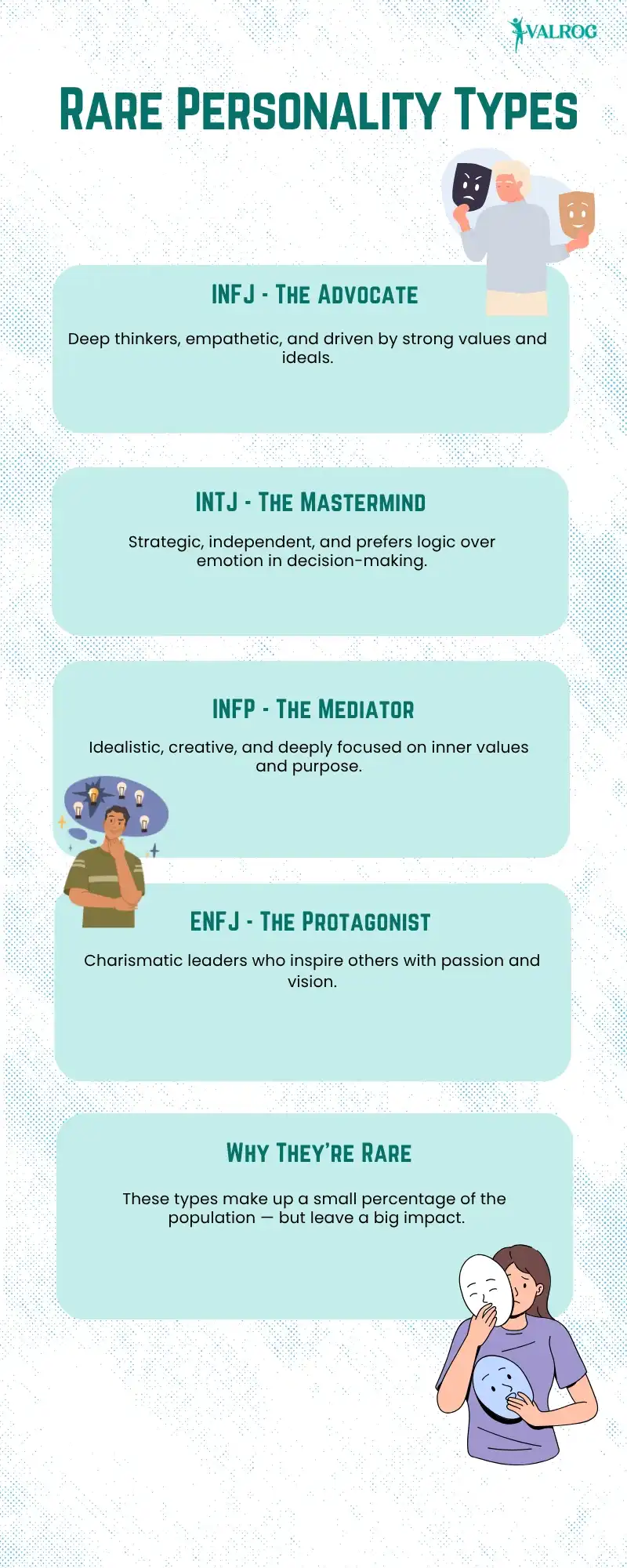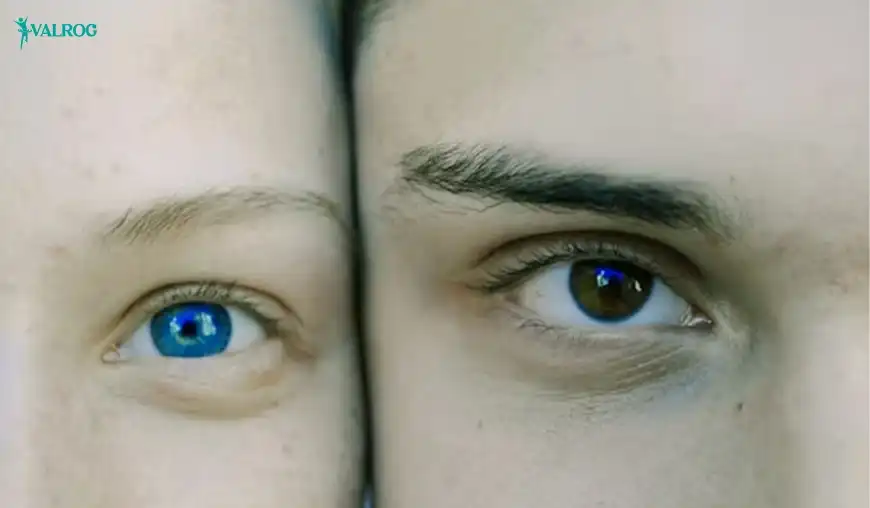Let’s not sugarcoat it, personality types are everywhere. On dating apps. On job applications. In casual conversation. But rare personality types? Now, that’s where things get interesting. The most rare personality type, sitting at the end of the Myers-Briggs bell curve, doesn’t just think differently, they feel, observe, process, and react on a level most people don’t even notice. And no, this isn’t about being quirky. It’s about being wired, unlike 98.5% of everyone else.

So, what is the rarest personality type? We’ll get there. And no, it’s not just a label. It’s practically a blueprint for how a person exists.
What’s the More Rare Personality Type Anyway?
Here’s the stat: INFJ makes up just 1.5% of the global population.
- Introverted
- INtuitive
- Feeling
- Judging
That’s not rare like “you ordered oat milk before it was cool” rare, it’s the least common personality type rare. The kind that can sit in a room of 100 people and find maybe one match. Maybe none.
INFJ stands for Introverted, Intuitive, Feeling, Judging, a mouthful, yeah, but the combo isn’t just uncommon. It’s an oddball cocktail of traits that don’t usually occur together. These are deep thinkers who feel everything. Planners who operate on gut instinct. They’re sensitive, but with a strategic edge. Empaths with a sharp focus. And that internal tension? That’s their superpower.
So if you’ve been asking, “What is the most rare personality type?” There’s your answer. INFJ. And it’s not even close.
Why INFJ Is the Rarest Myers Briggs Type (Statistically, Psychologically)
A lot of people throw around the term rarest MBTI, but few understand what’s actually behind it. The answer lives in the strange and layered combination of N and J traits.
Intuition (the “N”) makes you think in abstracts, like chess, but with emotions. You look beyond what’s happening now and chase patterns, symbols, possibilities. It’s the opposite of the “S” trait, which grounds people in reality.
Judging (the “J”) adds structure, finality, and direction. You close doors, draw lines, make plans, and build timelines. Combine this with that intuitive mindset, and now you’ve got someone who can daydream about alternate futures and build a spreadsheet to make them real.
Put them together in a rare personality type like INFJ, and you end up with someone who thinks in feelings and feels in logic. They don’t just read the room. They absorb it.
Other Rare Myers Briggs Types (Still Uncommon, Still Fascinating)
Being fair, INFJs are not the only rare Myers Briggs type worth talking about. While it’s the most rare personality type, a few others are statistically thin on the ground and equally compelling.
1. ENTJ – The Commander (~1.8%)
Stands for:
- Extraverted
- iNtuitive
- Thinking
- Judging
You know that person who walks into a room, spots the inefficiencies, and builds a better workflow before lunch? That’s ENTJ. Highly logical, future-focused, relentless. They don’t just think outside the box; they redesign the box.
2. INTJ – The Architect (~2.1%)
Stands for:
- Introverted
- iNtuitive
- Thinking
- Judging
Big on autonomy, low on chit-chat. INTJs are quiet visionaries. Strategy is their love language. They’re planners, thinkers, problem-solvers, and notoriously allergic to small talk.
3. ENFJ – The Giver (~2.5%)
Stands for:
- Extraverted
- iNtuitive
- Feeling
- Judging
Charisma on tap. They light up rooms and somehow still remember what you said two months ago about your dog’s surgery. Emotionally tuned in, but goal-oriented. Empaths who lead.
4. ENTP – The Debater (~3.2%)
Stand for:
- Extraverted
- iNtuitive
- Thinking
- Perceiving
Hyperverbal. Hypercurious. These are the people who’ll argue both sides of a topic just to see what happens. ENTPs are chaotic-good energy, wired to question everything, even their own thoughts.
The trend? Most rarest MBTI types include the N trait. Intuition is rare in itself. Combine that with less-common pairings like F or J, and you start hitting the low numbers.
Why Are These Personality Types So Rare?
Weird thing about personality: it’s shaped by everything. Biology, upbringing, society, even the TV shows you grew up watching. But some types, especially those with high Intuition and deep Feeling, don’t get rewarded by the world at large.

Think about it. School systems prioritize facts, logic, and outcomes. So do workplaces. Kids with “S” traits are praised for paying attention. Kids with “N” traits get called daydreamers.
A 2009 study by Quenk found that sensing types (S) make up roughly 70% of the U.S. population. No wonder intuitive folks seem rare; they are. Culture nudges people toward fitting in, not floating off into abstract clouds or fighting for invisible causes.
This is why the least common personality types often feel like they’re “off.” They’re not off. They’re just outnumbered.
The Daily Life of a Rare Personality Type
Being a rare personality type isn’t like owning a shiny badge you flash at parties. It’s more like being the only one in the group who’s hearing music no one else notices. Sometimes it’s beautiful. Sometimes it’s deafening.
INFJs, for example, are notorious for needing deep connections but struggling to find them. They want small talk to die a quick death. They crave authenticity. They’re laser-focused on meaning and allergic to surface-level anything.
They often feel torn between giving everything to others and protecting their peace. Between speaking out and staying silent. They care, sometimes too much. They overthink, even the stuff no one else notices.
But this internal chaos? This constant emotional ping-pong match? That’s the INFJ blueprint. And it’s why many call them the most rare personality type. Not just in number, but in depth.
So, What’s the Rarest Personality Type Good At?
Let’s stop pretending that being rare means being fragile. INFJs and other rare personality types often thrive in roles that blend big-picture thinking with high emotional intelligence.
We’re talking therapists, novelists, advisors, strategists, and humanitarian workers. INFJs aren’t built for small goals. They’re built to impact.
INTJs? Give them a system to fix. ENTJs? Let them lead your next company into a rebrand. ENFJs? Have them coach your team into higher retention and morale. ENTPs? Give them a problem, then get out of the way.
This isn’t theory. The study from Myers & McCaulley (1985) showed that INFJs, while rare, score higher in areas related to values-based leadership, empathy-driven roles, and creative problem-solving.
Common Struggles (Because No Type Gets a Free Pass)
Let’s not sugar-coat rare like it’s a superpower that glows in the dark. It’s lonely. It’s confusing. It can feel like being fluent in a language no one else speaks. INFJs may find themselves ghosting people just to recharge. INTJs may come off cold when they’re just focused. ENTPs might annoy people by challenging every. single. thing.
Being a rare MBTI often means you’ve spent years trying to translate your inner wiring into a language others can understand. That gets tiring. Even INFJs, known for emotional insight, get misunderstood more often than you’d expect. Or maybe not.
What’s the Rarest Personality Type For Real?
Back to the big one. Yes, INFJ is what’s the most rare personality type. It checks every box: statistically lowest, emotionally complex, socially misunderstood, psychologically fascinating.
It’s also the personality type most likely to end up in late-night Google searches like “why do I feel like an alien” or “why does everyone think I’m quiet but I’m just observing their soul through their eyes.”

That’s not a joke. INFJs are intense. But their intensity isn’t loud. It’s soft, patient, layered. They won’t shout to be heard. They’ll whisper, and somehow, everyone leans in.
Wrapping Up: Rare Doesn’t Mean Better, It Just Means Rare
So, what is the rare personality type? INFJ. Hands down. But that doesn’t make them elite or chosen or golden. Just different. Just rare.
And the thing about rare people? They build the stuff everyone else uses later. They plant the ideas, feel the shifts, imagine the futures others can’t yet see. Sometimes misunderstood, often underestimated, but always essential.
You could be an INFJ, INTJ, ENTJ, ENFJ, or one of the other rarest Myers-Briggs type profiles; know this: your difference is valid. Your wiring isn’t wrong. And the things that make it hard to define you? They’re also the things that make you unforgettable.
